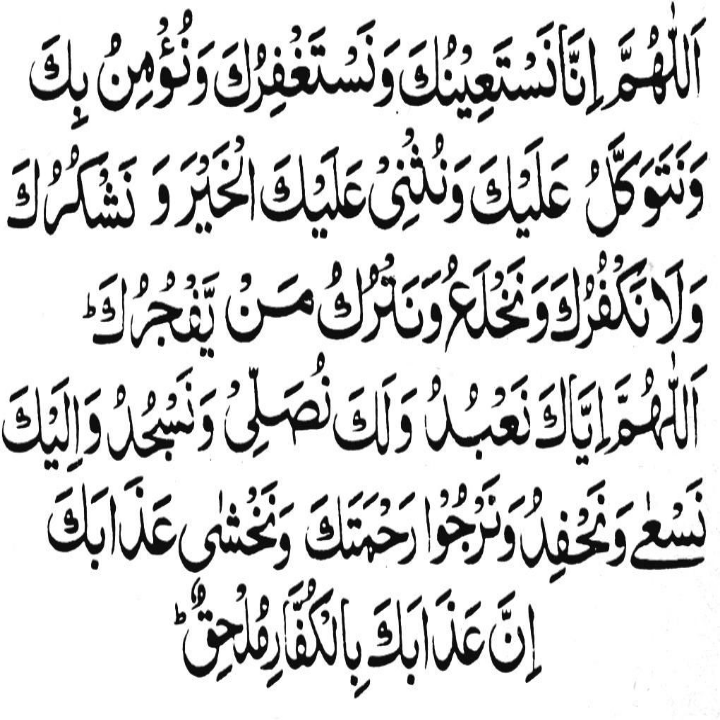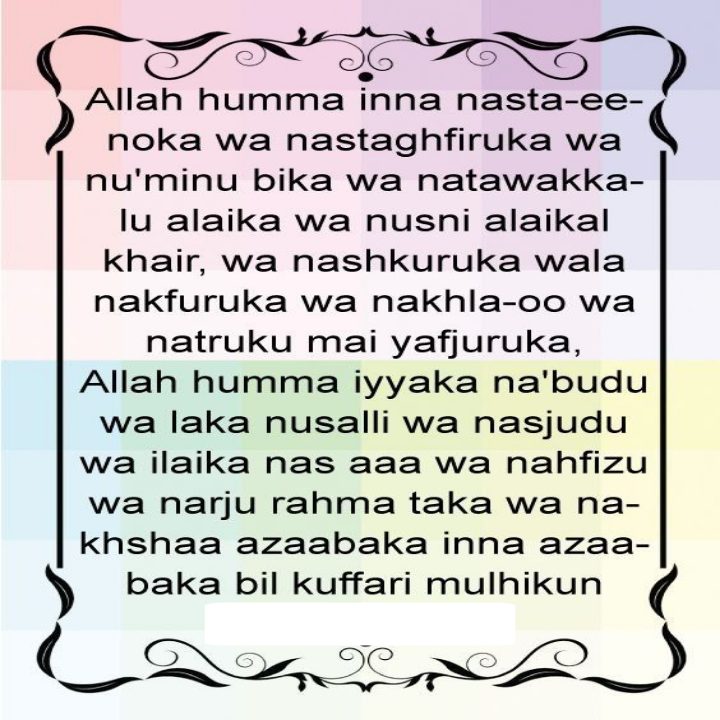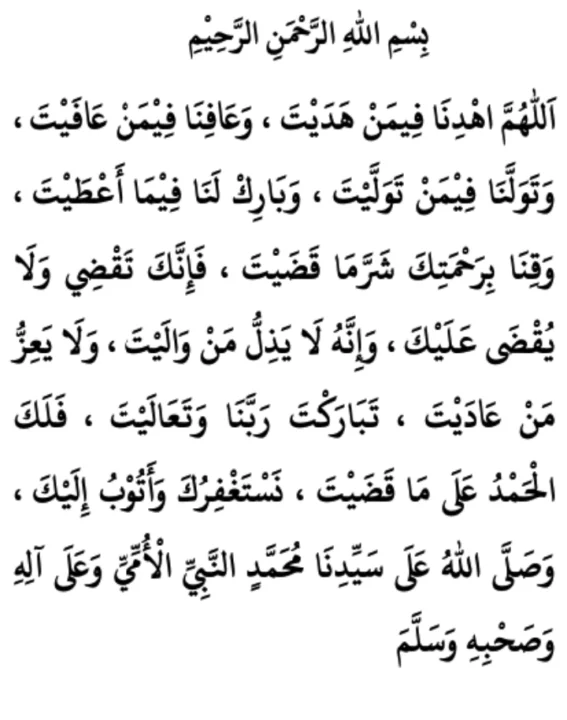
The word Qunoot (الْقُنُوْتُ) is derived from Arabic language. That carries several meanings including standing long, silent, always obedient, submissive, prayer and khusu. While the meaning of Dua e Qunoot in terms is a prayer that a Muslim recites in Witr Namaz while standing.
Also read: Benefits of Ayat Ul Kursi
Imam Ahmad narrated from Anas RA, he said:
“Rasulullah SAW always read Dua Qunut in the morning prayer until his death”
He has been asked: ‘Does the Messenger of Allah read qunut at dawn?’
The answer: ‘Yes’.
There are three types of Dua Qunoot, namely Qunut in morning prayer, Qunut in witr prayer and Qunut Nazilah.
Dua e Qunoot in Witr prayer.
The followers of Hanfi school recite Dua e Qunoot in Witr Namaz. Witr prayer comprises on three Rakats. Whereas the process of this Namaz is same the others prayers. However, following Dua Qunoot added in third Rakat after reciting the Surah Fatiha and any other surah raising both hands while standing. After reading the Qunoot prayer the other procedure is same.


Fajar Prayer Dua Qunoot
In the second rakat of the fard dawn prayer before prostrating, remain standing straight by raising both hands and praying reciting following Doa qunut.

If the obligatory morning prayer is in congregation, the recitation of the qunut is slightly different from the recitation of the prayer alone.
This difference is because the Arabic personal pronoun ‘Ku’ (nii) was changed to ‘Kami’ (naa) to suit the large number of congregations (more than one).
Ruling on Reading the Dua e Qunoot
There are various erroneous views and differences of opinion among scholars regarding the rule of Dua Qunoot in Fajar prayer.
Imam Shafi thinks that reciting Qunut in the morning prayer is a muakkad circumcision that is highly encouraged.
If one misses or forgets to recite the Qunut, one is circumcised to do the Sajda Suhoo. However, the morning prayer is still valid even without Sajda Sahoo.
The view of the Shafi School is also firmly held by the Muslim community, especially in Malaysia and the entire archipelago.
Qunut Nazilah Prayer
The meaning of Nazilah in terms of language is a dire, alarming and desperate situation.
Whereas, in terms of meaning, it means a catastrophic situation that befalls Muslims such as the presence of enemies, fear, drought, disease outbreaks or something that clearly harms Muslims.
Qunut Nazilah is a prayer recited after ruku’ (during i’tidal) in the last rak’at of prayer.
The rule is sunnah (if forgotten and left behind, there is no need to Sajda Sahoo.
Qunut Nazilah is implemented because there is an event (disaster) that befalls, such as a natural disaster or war.
The Implementation Method of Qunoot Nazilah
Dua Qunoot Nazilah can be read at every obligatory prayer: Zuhor, Asr, Maghrib, Isyak and Subuh.
It is recited in the last rakaat after getting up from Rukuk for Iktidal.
A prayer is read while standing for Iktidal.
There are three ways of reading the prayer, that is, we can choose one of the following ways:
Read the Qunut prayer as it is usually read during the morning prayer.
Reading Qunut subuh and followed by Qunut Nazilah.
According to the opinion of the majority of scholars, there is no specific prayer that needs to be read in the Qunut Nazilah prayer.
Therefore, the prayer that is read is what is appropriate to the calamity that happened at that time.
For example, when a natural disaster occurs, we can pray specifically for protection from God.
If there is a war like in Palestine and Syria, we pray specifically for our brothers there.
Nevertheless, there is the text of the Nazilah Qunut Prayer that is commonly taught to us.
Dispute
Although there is a dispute regarding the law of reading qunut in the morning prayer. But we should know that qunut is the sunnah of the Prophet, may God bless him and grant him peace, and leaving it is also his sunnah.
People who argue and sulk simply because they argue about the law of reciting qunut in the morning prayer are actually not following the sunnah of the Prophet, peace be upon him.
Scholars in the past have debated at length about twig issues such as the qunut prayer.
As a result, scholars in the Shafi school think that qunut is circumcision, but the view of scholars in other schools is not the same.
They disagree in a harmonious atmosphere. Specially Hanfi School keep emphasis on reading Dua e Qunoot in morning prayer.
The law of Subuh prayer remains valid even if the Qunoot is recited or not.
Closing
The attitude of following the sunnah is good and noble, but it is not that narrow.
The Prophet’s Sunnah is a reference and it is open to interpretation.
So open-mindedness and tolerance are the best traits that we need to practice.


